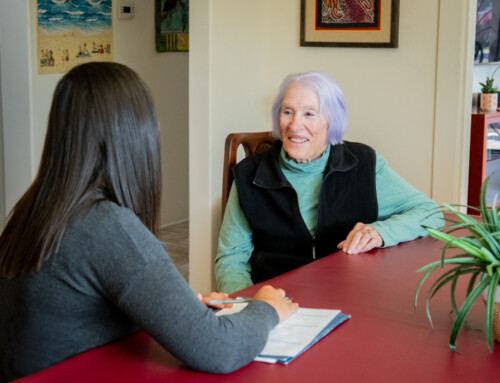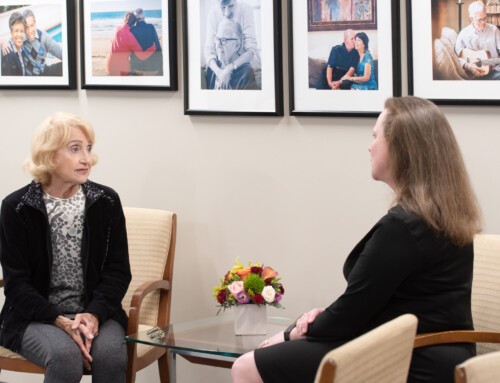By Kara Jacobsen
This past Saturday, hundreds of people attended our annual Date With A Cure research forum. Thanks to the expert panel, participants were able to get their questions about Alzheimer’s and other types of dementia answered by the very scientists working to find a cure. This year’s forum covered the hot topics of Alzheimer’s drug aducanumab, the link between Alzheimer’s and Parkinson’s, other drug advancements, caregiver stress, and much more.
Watch the 2021 research forum below and read some of the event highlights from each of the panelists and participants. You can download the slides by clicking here >>
To begin, Alzheimer’s San Diego President/CEO Eugenia Welch shared the news that the number of people living with Alzheimer’s and related dementias in San Diego County has increased to 100,000 – up from 84,000 in 2018. Local philanthropist Darlene Marcos Shiley then spoke about the successes of our research initiative, Collaboration4Cure (C4C). Since its inception in 2015, C4C has provided more than $1.1 million in funding to 17 local research projects. Four of these projects were so promising, they went on to receive $8.76 million in funding from the National Institute on Aging. Without Mrs. Shiley, C4C wouldn’t exist. We are grateful for her continued support!
LEARN MORE | Collaboration4Cure
Amy Abrams, MSW/MPH, Alzheimer’s San Diego Director of Education, served as the event moderator. Amy explained that dementia is not a specific disease, but an umbrella category. Alzheimer’s is the most common type of dementia, but there are many others such as frontotemporal dementia (FTD), vascular dementia, and more. Alzheimer’s San Diego supports people with all forms of dementia and memory loss.
You can read some of the highlights from each researcher below.
Dr. Robert Rissman, UCSD Center for Neurodegeneration & Experimental Neuropathology
Dr. Rissman introduced his research concerning stress hormones and Alzheimer’s disease, specifically the Corticotropin Release Factor receptor (CRF). In mice, drugs that block CRF seem to improve cognition. However, there aren’t enough CRF blockers in humans that are safe and effective. His work on this subject was submitted to the National Institutes of Health (NIH) for funding but they weren’t interested because it was an old topic – which is why receiving a grant from C4C was critical to continue his research. In 2020, Dr. Rissman was awarded $1.73 million by the NIA to continue this groundbreaking work.
Dr. Jerold Chun, Sanford Burnham Prebys Medical Discovery Institute
Dr. Jerold Chun explained there is still much to be learned about the brain. There are many different theories about what causes Alzheimer’s disease, such as amyloid plaques and tau tangles in the brain. He is particularly interested in studying genetic mosaicism, which is when a person has two or more genetically different set of cells in their body. Dr. Chun said there is so much diversity of cells in the brain, this could potentially explain the presence of comorbidities (or multiple types of dementia) being present in some cases.
RELATED | Alzheimer’s research in San Diego County
Dr. Paul Aisen, USC Alzheimer’s Therapeutic Research Institute
Dr. Aisen explained that the new Alzheimer’s drug, aducanumab, is an antibody that binds to the protein and promotes clearance of amyloid plaques in the brain. The drug removes and normalizes amyloid in the brain when administered during a certain timeline, but has some risks such as small bleeding and swelling in the brain. This is because amyloid affects small vessels in the brain. He said the decision to approve the drug with only one positive phase 3 clinical trial is very controversial, and that the FDA could still withdraw approval if it doesn’t perform well in the post-approval trial. But Dr. Aisen believes aducanumab will move the field forward and lead to future drug discovery, focusing on the removal of amyloid plaques.
Dr. James Brewer, UCSD Shiley-Marcos Alzheimer’s Disease Research Center
Dr. Brewer shared that UCSD is working on establishing a research center in the South Bay region in Chula Vista to encourage the Latinx community to participate since “one of the really missing aspects across the nation in Alzheimer’s disease programs is the understanding of these diverse communities”. The latest findings also show the APOE4 gene may have different impacts for risk in the Latinx community and may not be the most relevant marker. He noted that most drug trials test on mainly people of European descent, and that they’re unlikely to perform as well in diverse communities. Dr. Brewer is hopeful about finding a cure now that scientists are able to study Alzheimer’s disease in living humans, thanks to advances in detecting biomarkers in the blood.
Dr. Brent Mausbach, UC San Diego Health
Dr. Mausbach’s research focuses on caregiver stress. He encouraged people to visit www.clinicaltrials.gov and search for “caregivers” if they are interested in finding a clinical trial to participate in. He also shared a helpful acronym that caregivers can use to ensure they’re taking care of themselves: GRAPES.
G = Gentle. Be gentle with yourself and avoid focusing on negative thoughts about yourself
R = Relax. Practice yoga or meditation
A = Accomplishments. Take time to acknowledge and accept them as being real, even the little ones.
P = Pleasant activities in daily routine. These help to provide us with a sense of meaning.
E = Exercise
S = Socialize with positive people
Dr. Michael Plopper, Sharp Mesa Vista Hospital Clinical Research Center
On the topic of aducanumab, Dr. Plopper described the financial burden, at an estimated cost of $50,000+ annually. He believes if Medicare were to approve payment for this, it could bankrupt the system. Also, since the drug is amyloid-targeted, a PET scan will probably be required to avoid prescribing aducanumab to someone without amyloid plaques. With the reality of the current medical community, Dr. Plopper says “they probably don’t have enough specialists right now to be able to assess people well enough and deliver this drug”. He said he is hopeful about the dementia research landscape, particularly because of the number of people willing to participate in clinical trials.
Dr. Sherry Soefje, Excell Research
A critical part of advancing research is clinical trial participation. Dr. Sherry Soefje demystified the clinical trial process. She explained that most clinical trials require participation for 18 months, but they are easy to enroll in if you meet the criteria. When a question about researching cannabinoids was asked, she said that most trials will not accept participants if they test positive for cannabis (a practice she disagrees with). Dr. Soefje said that she’s excited about the number of Alzheimer’s trials coming out, and the diversity of targets being explored such as amyloid plaques, tau tangles, and other possible disease mechanisms.




